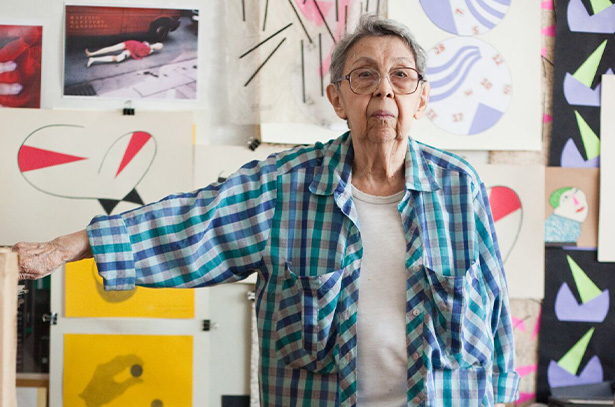
Geta Brătescu
The Power of the Line
27 February - 27 April 2019
London
Installation views
Related Content
About the Artist

Geta Brătescu
One of the first representatives of conceptualist approaches in Romania, Geta Brătescu’s oeuvre comprises drawing, collage, textiles, photography, experimental film and performance. In her seven-decade career, she has published a number of books documenting her daily studio activities and personal experiences of art and travel.
Brătescu spent much of her working life in Bucharest under the Communist regime. She developed a deeply personal practice concerned with themes of identity, gender and dematerialisation. Her aesthetic—lo-fi, handmade, incorporating inexpensive, everyday materials—evolved from an attitude towards her studio as a safe environment of enclosure as well as a stage for playful invention. Memorialised in a key film, ‘The Studio,’ 1978 was a room of her own in which she could create work independently.
In addition to the objects and materials at hand, Brătescu was devoted to literature and would often draw inspiration from the stories of characters in famous texts. Aesop and Medea, Mother Courage and Faust, all played starring roles in her work, functioning as alter-egos and conduits for self-expression and frequently an oblique form of political subversion.
From 1945 to 1949, she studied at the Faculty of Letters and Philosophy at the University of Bucharest and at the Bucharest Academy of Fine Arts. In 1950 her studies were interrupted by the Communist government, and she was unable to complete her art education until 1971. Following her exclusion from university, Brătescu maintained a studio practice whilst working as an illustrator and graphic designer, becoming in the early 1960s the artistic director of the prestigious literary magazine, Secolul 20.
In 2008 Brătescu was honored with the title of Doctor Honoris Causa from the National Arts University in Bucharest for her contribution to the landscape of contemporary Romanian art. In 2017 she represented Romania at the Venice Biennale and was awarded by the President of Romania the Order of the Star of Romania.
Current Exhibitions
1 / 11














